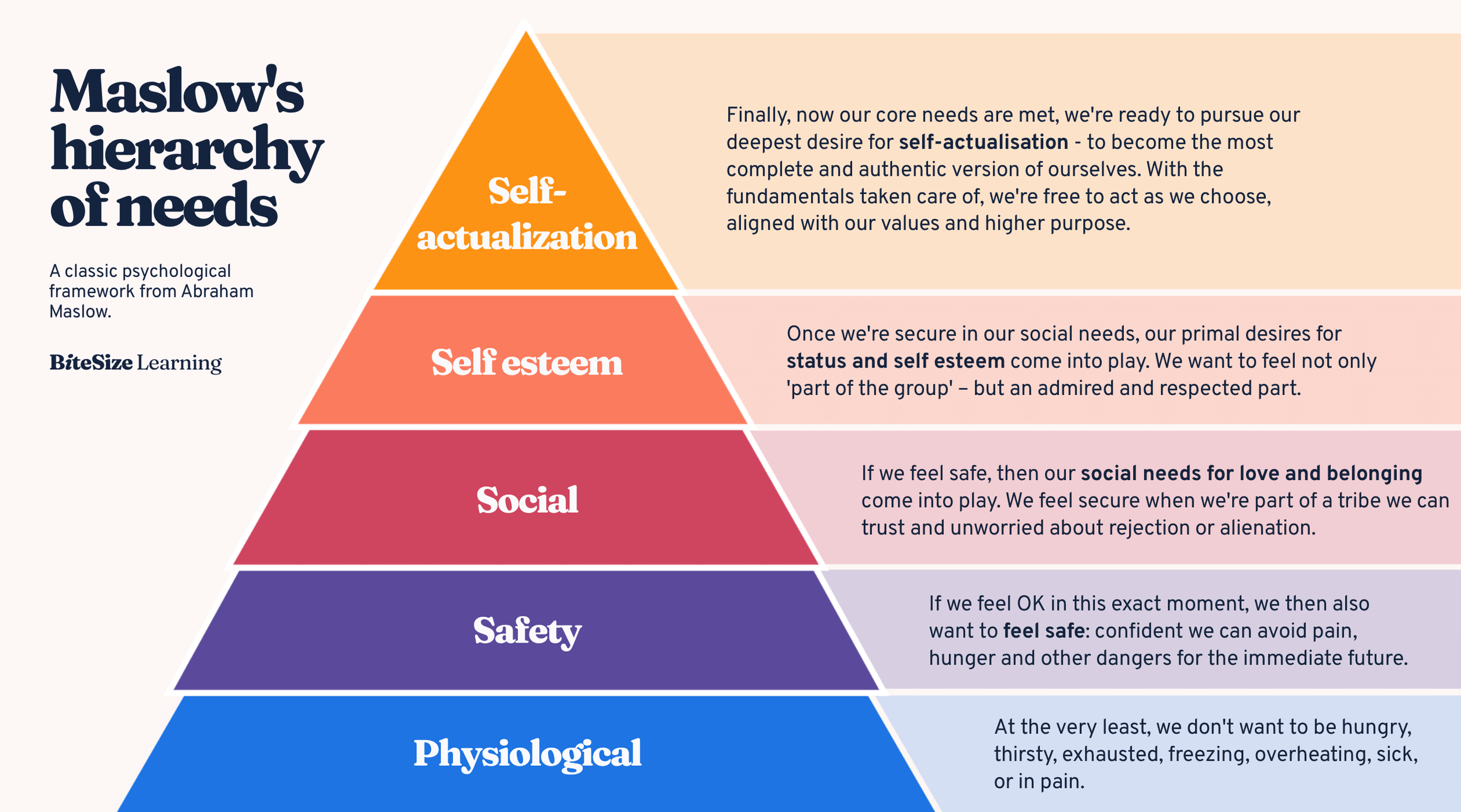Have you ever wondered why people act the way they do? Why does your peer at work seem so stressed about something small, or why your friend is suddenly obsessed with joining every social club? I’ve been studying Maslow who I believe may have some answers for you.
I am in no position to give you a psychology lecture. But understanding a bit about Maslow’s Hierarchy of Needs can be a real game-changer in how you interact with others, both in and out of the office.
So, what’s this hierarchy all about? Imagine a pyramid. At the bottom, you’ve got basic needs like food and safety. As you move up, you get into stuff like love, esteem, and at the very top, self-actualization. Fancy words, I know, but stick with me here.
Here’s the kicker: people are usually focused on fulfilling needs at their current level. And until those needs are met, it’s hard for them to care about anything higher up. So basically, I don’t care about my self esteem until I am not hungry and homeless. Pretty simple.
So let’s break it down with some real-life examples:
- Physiological Needs: This is the basics – food, water, sleep. Ever tried to have a productive conversation with someone who’s hangry? Yeah, not fun.
- Safety Needs: This includes job security, health, and a stable environment. If someone’s worried about losing their job, they’re probably not going to be too concerned about team bonding activities.
- Love and Belonging: This is where relationships come in. That coworker who’s always organizing happy hours? They might be fulfilling this need.
- Esteem: This is about recognition and respect. That person gunning for a promotion? They’re probably at this level.
- Self-Actualization: This is the top of the pyramid. It’s about reaching your full potential. The person always looking for new challenges? They’re here.
So, how can understanding this help you in your daily life? Well, it’s like having a secret decoder ring for human behavior.
When you’re dealing with someone, try to figure out what level they’re operating on. Are they stressed about basic security? Or are they looking for recognition? Once you know that, you can adjust how you interact with them.
For example, if your team member is worried about job security, piling on more work or talking about long-term projects might not be the best move. Instead, you might want to reassure them about their position or help them feel more secure in their role.
Here’s the thing: understanding Maslow’s Hierarchy isn’t about manipulating people. It’s about empathy. You’ll hear me talk about that a lot in the Human Factor because a lot of times people confuse it with “sympathy” which isn’t even close.
It’s about recognizing that everyone has different needs and motivations. And when you can tap into those, you can communicate more effectively and build stronger relationships.
The biggest takeaway here is giving you the insight you need to connect with others by meeting them where they are now.
As a co-founder of The Constance Group, I’m at the forefront of revolutionizing sales and leadership strategies worldwide. Our difference? The proprietary “Sales Funnel©” methodology—an innovative approach that significantly enhances selling processes, complemented by our programs in leadership, negotiation, and sales development.
Our distinct edge lies in our personalized approach. Prior to any keynote or workshop, I personally collaborate with stakeholders and attendees to develop a tailored, impactful program. This commitment goes beyond content delivery; it’s about crafting actionable insights that participants can immediately leverage for real-world impact.
Rooted in behavioral science, our strategies offer profound insights into human behavior, empowering your team to navigate complex scenarios with positive outcomes. Our sessions are designed to be engaging and memorable, mixing potent messages with humor and narratives that not only resonate but also inspire lasting change.






